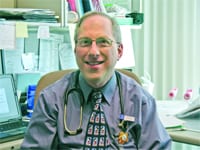Louis & Clark Addresses Drug-compounding Controversy
SPRINGFIELD — Patients taking compounded drugs and their families and caregivers may be understandably leery as deaths from fungal meningitis caused by tainted steroid injections distributed by the New England Compounding Center (NECC) in Framingham continue to rise.
Skip Matthews, president of Louis & Clark, the local company whose healthcare services include a pharmacy on Birnie Avenue that does compounding, wants people to know that drug compounding like that done by Louis & Clark and similar pharmacies is far different from the high-volume business operated by NECC.
Thirty-four people have died after receiving the tainted injections from NECC, and 461 have been sickened. “The resulting publicity,” said Matthews, “is causing confusion about just what compounding is and whether it’s safe. Compounded drugs have many, many benefits for patients, and we do not want people to be frightened by the idea of using compounded drugs and forego their significant advantages.”
Compounding is the customized preparation of a medicine for an individual patient that is not otherwise commercially available. Sometimes this involves combining multiple drugs into one pill, and other times it involves changing the prescribed drug into a form that is easier for that patient to use, such as a liquid, a gel, a lozenge, or a suppository. Compounded drugs are also prescribed by veterinarians for pets whose owners have a hard time getting them to swallow pills or when the pets need to take multiple drugs. According to the International Academy of Compounding Pharmacists, an association representing more than 2,700 pharmacists, technicians, students, and members of the compounding community, an estimated 76{06cf2b9696b159f874511d23dbc893eb1ac83014175ed30550cfff22781411e5} of independent pharmacists in the U.S. and almost all hospital pharmacies do compounding.
Louis & Clark began focusing on compounding in the early 1990s. “A couple of decades ago, we decided to become specialists in this area so we would be able to meet a wider variety of patient needs,” said Matthews. “The staff members who do compounding have advanced training in this area, including one who is certified to do veterinary compounding. We have become a leader in compounding in this area, and many healthcare providers rely on us to customize dosage sizes, formulations, and preparations to meet patient needs. Our staff works closely with physicians and patients to customize solutions for many different types of situations.
“The analogy I use to help people understand the difference between how we operate and how NECC operated is that what we do is more of a craft, as opposed to a high-volume business,” he continued. “Typically, we compound between seven and 15 medications a day, filling individual prescriptions we receive from local physicians. In contrast, NECC was creating thousands of doses of steroid injections and shipping them all across the country. In fact, more than 14,000 people received the tainted drugs from them, so, in essence, they were a manufacturer, not a pharmacy.”
Matthews added that “a good example of a situation in which compounding can be really helpful is when someone is in end-stage hospice care and is no longer able to swallow. We can transform their medication into a cream or a gel that is applied transdermally. We can also blend two or three medications into one gel that will be absorbed through their skin.”
Another frequent problem is children who will not take pills, he noted. “So we transform the medicine into a liquid. In addition, we can change the dosage to make it more appropriate for a child. And when it comes to medicines for cats and dogs, you can imagine how much those have to vary based on the pet’s weight. These are all the types of situations our specially trained pharmacists and technicians deal with on a daily basis, and their skills solve a lot of problems. It would be a shame if people don’t get the help they need because they have been frightened by the NECC scandal. So we’re working to get out the word about the difference between what they were doing and what legitimate compounding pharmacists do.”


Comments are closed.